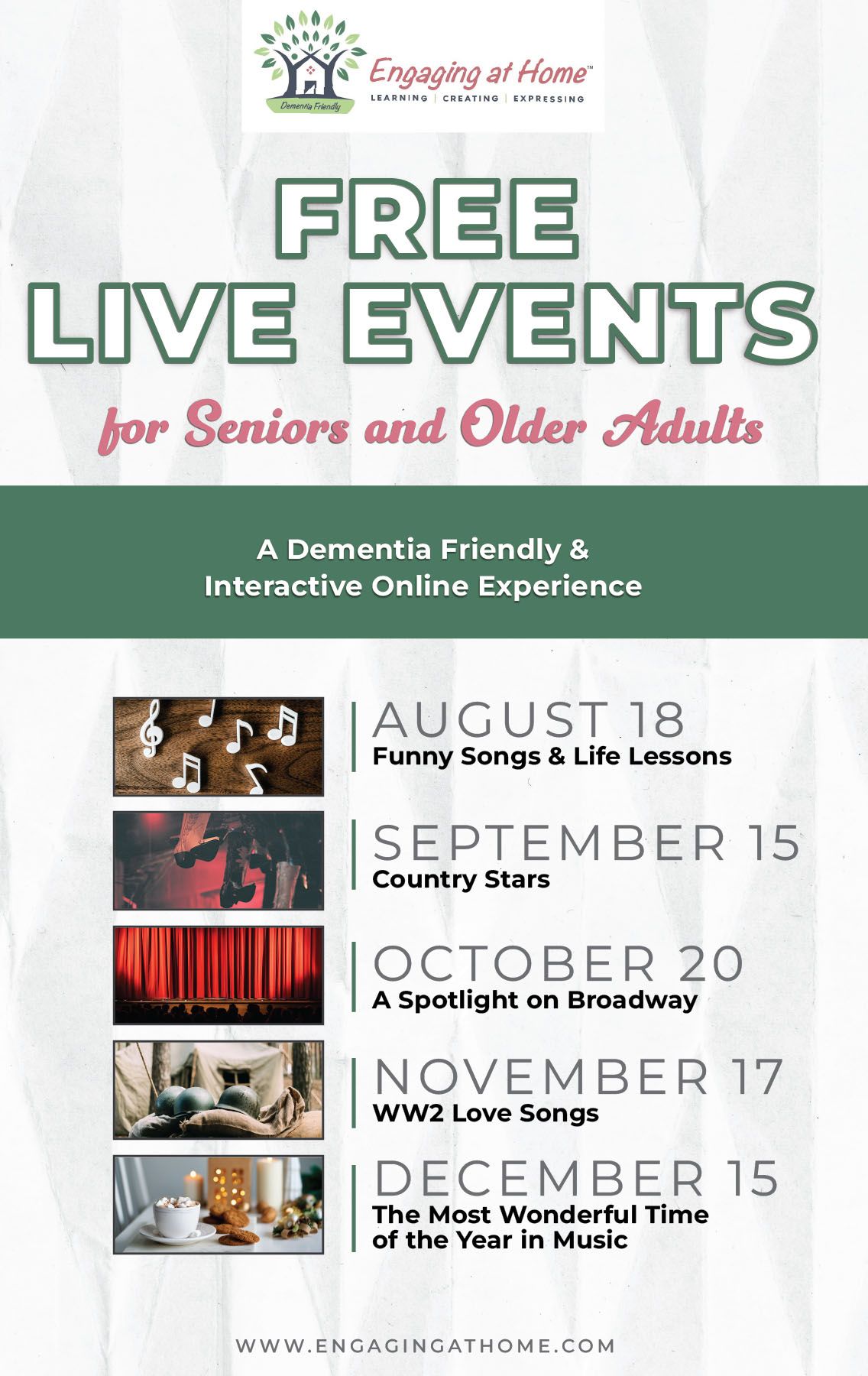
When
you think about the summertime, do you think of days in the sun, relaxing by
the pool, with an ice-cold drink by your side? Or, as a caregiver for someone
with dementia, has your idea of summer become anything but a vacation? We know
your days are not always free and easy, and perhaps the summer months add more
stress to your plate than others might realize. We recognize some of the
challenges you might face, but we believe there is still so much fun to be had
for you, and your aging loved one – even when the summer days might feel like
they are blending together!
We understand your calendar might already be bursting at the seams. Adding to your list of things to do might seem like an outlandish notion, but expanding your calendar might become one of your strongest tools during the hot summer months. No matter what stage of disease progression your loved one might be in, having a daily routine can help your loved one living with dementia navigate their world in a way that feels predictable and secure. Even though their memory might fail them, your loved one still craves a sense of familiarity.
Alzheimer's Project states that by creating an environment of familiar routines and activities, you can help your loved one improve their ability to plan, initiate, and complete an action. In addition, you can create a rhythm by identifying specific tasks within your routine that can be timed and tailored to promote your loved one's sense of control — for example, administering medications at the same time every day.
As you look over your calendar, find a label that honors your loved one's independence and respects who they are as a person. For example, consider calling your day-to-day activities a "routine" versus a "schedule." Let your loved one know that you have a routine planned for the day in a way that kindly communicates that there is a pattern of exciting events ready to unfold. The Blue Zones refers to this as a "Plan da Vida" or plan of the day. Planning adds purpose and meaning to our days.
When settling into your routine, do not be afraid to break up the mundane by scheduling a few fun events, even if they are just simple things done at home. Incorporating music into your day, for instance, offers a world of possibilities for you and your loved one to enjoy. Studies have found that listening to music every day can aid in the recovery of cognitive functions through the improvement of verbal memory, focused attention, and mental health. So, try setting aside time each day to listen to some of your loved one's favorite tracks from when they were growing up – maybe even check out this free Beach Boys Musical Reminiscing activity from Engaging at Home for a fun place to start!
Even during the busiest of weeks, make sure the chances of connecting with your loved one are not lost between the lists of ordinary tasks. This summer, give everyone something to look forward to and remind them that something exciting is coming down the line. Fun events scheduled ahead build enthusiasm and a sense of wonder for what's to come. It's easy to get washed up trying to keep up with daily repetition, so break up the monotony and create a summer of fun by putting a few new things on your calendar!
Engaging at Home™ helps caregivers to feel empowered by offering ways to have meaningful engagement with loved ones who have cognitive impairment. We provide narrated videos, live Zoom sessions, activities, seated wellness and fitness videos, etc. Contact us today for a free 14-day trial.
We understand your calendar might already be bursting at the seams. Adding to your list of things to do might seem like an outlandish notion, but expanding your calendar might become one of your strongest tools during the hot summer months. No matter what stage of disease progression your loved one might be in, having a daily routine can help your loved one living with dementia navigate their world in a way that feels predictable and secure. Even though their memory might fail them, your loved one still craves a sense of familiarity.
Alzheimer's Project states that by creating an environment of familiar routines and activities, you can help your loved one improve their ability to plan, initiate, and complete an action. In addition, you can create a rhythm by identifying specific tasks within your routine that can be timed and tailored to promote your loved one's sense of control — for example, administering medications at the same time every day.
As you look over your calendar, find a label that honors your loved one's independence and respects who they are as a person. For example, consider calling your day-to-day activities a "routine" versus a "schedule." Let your loved one know that you have a routine planned for the day in a way that kindly communicates that there is a pattern of exciting events ready to unfold. The Blue Zones refers to this as a "Plan da Vida" or plan of the day. Planning adds purpose and meaning to our days.
When settling into your routine, do not be afraid to break up the mundane by scheduling a few fun events, even if they are just simple things done at home. Incorporating music into your day, for instance, offers a world of possibilities for you and your loved one to enjoy. Studies have found that listening to music every day can aid in the recovery of cognitive functions through the improvement of verbal memory, focused attention, and mental health. So, try setting aside time each day to listen to some of your loved one's favorite tracks from when they were growing up – maybe even check out this free Beach Boys Musical Reminiscing activity from Engaging at Home for a fun place to start!
Even during the busiest of weeks, make sure the chances of connecting with your loved one are not lost between the lists of ordinary tasks. This summer, give everyone something to look forward to and remind them that something exciting is coming down the line. Fun events scheduled ahead build enthusiasm and a sense of wonder for what's to come. It's easy to get washed up trying to keep up with daily repetition, so break up the monotony and create a summer of fun by putting a few new things on your calendar!
Engaging at Home™ helps caregivers to feel empowered by offering ways to have meaningful engagement with loved ones who have cognitive impairment. We provide narrated videos, live Zoom sessions, activities, seated wellness and fitness videos, etc. Contact us today for a free 14-day trial.



